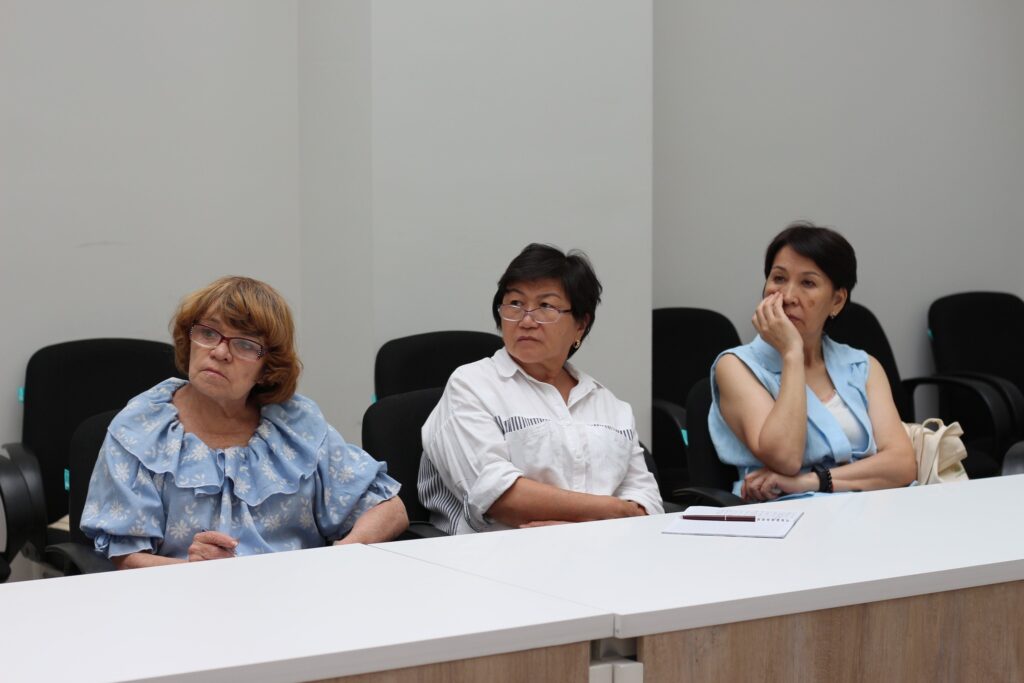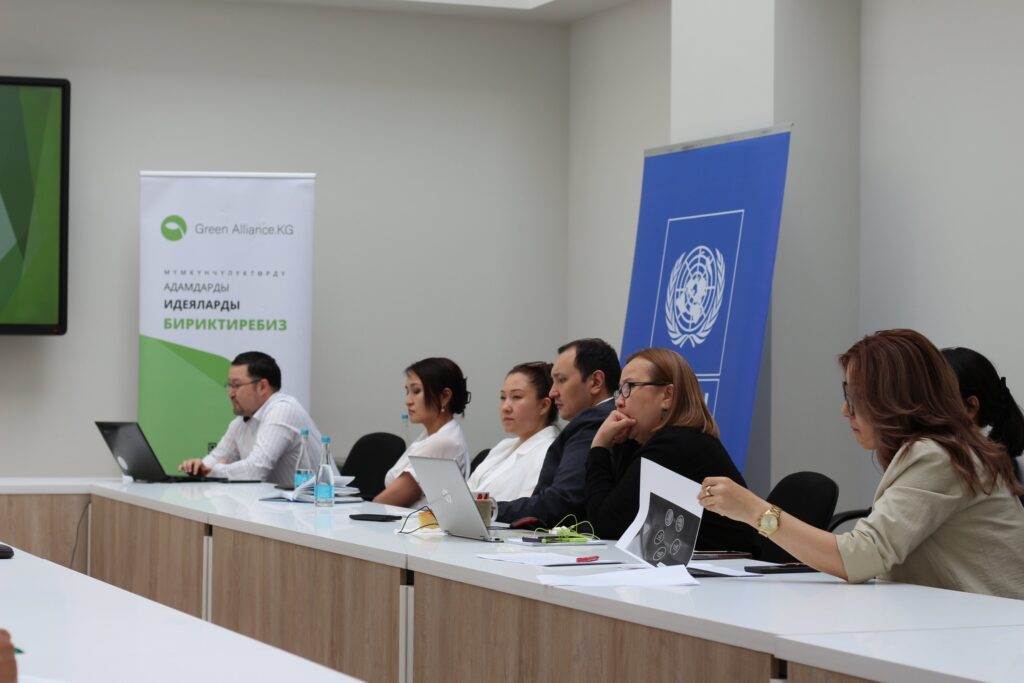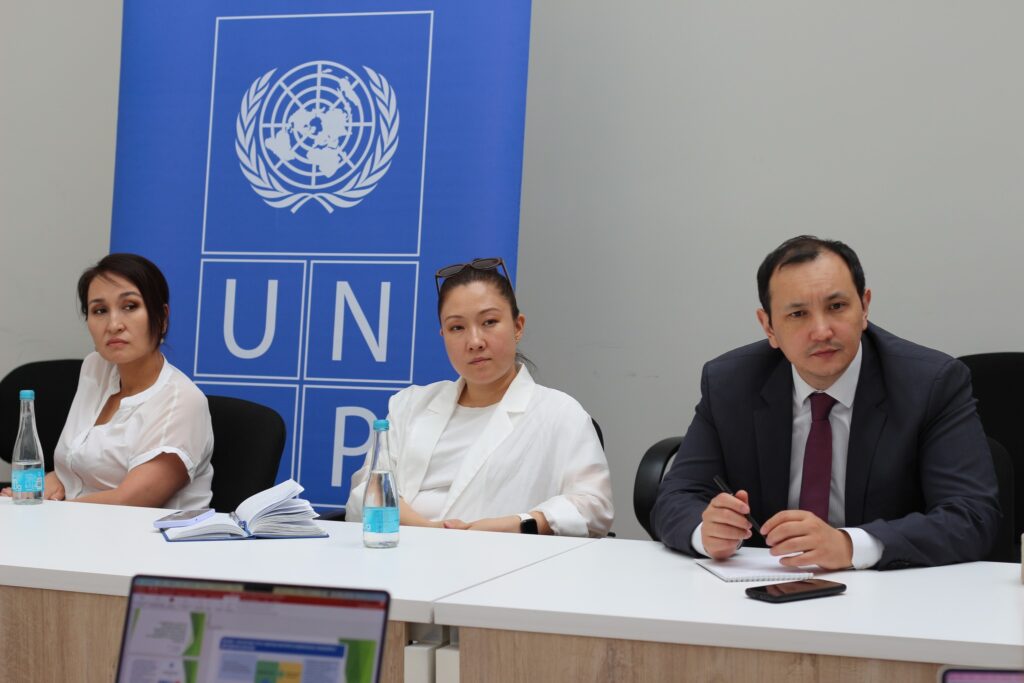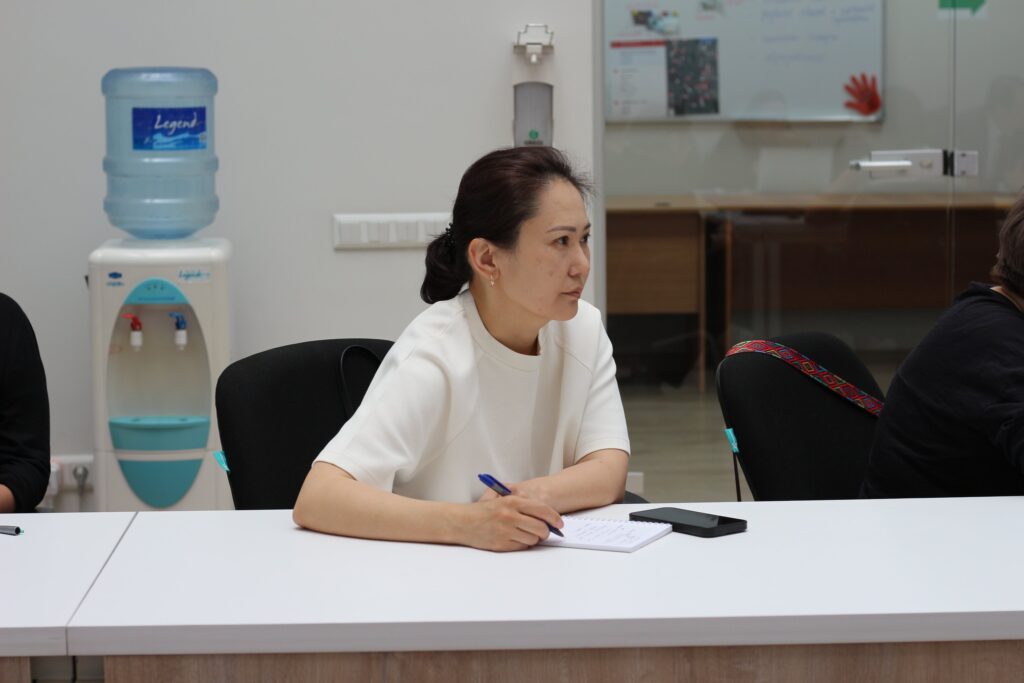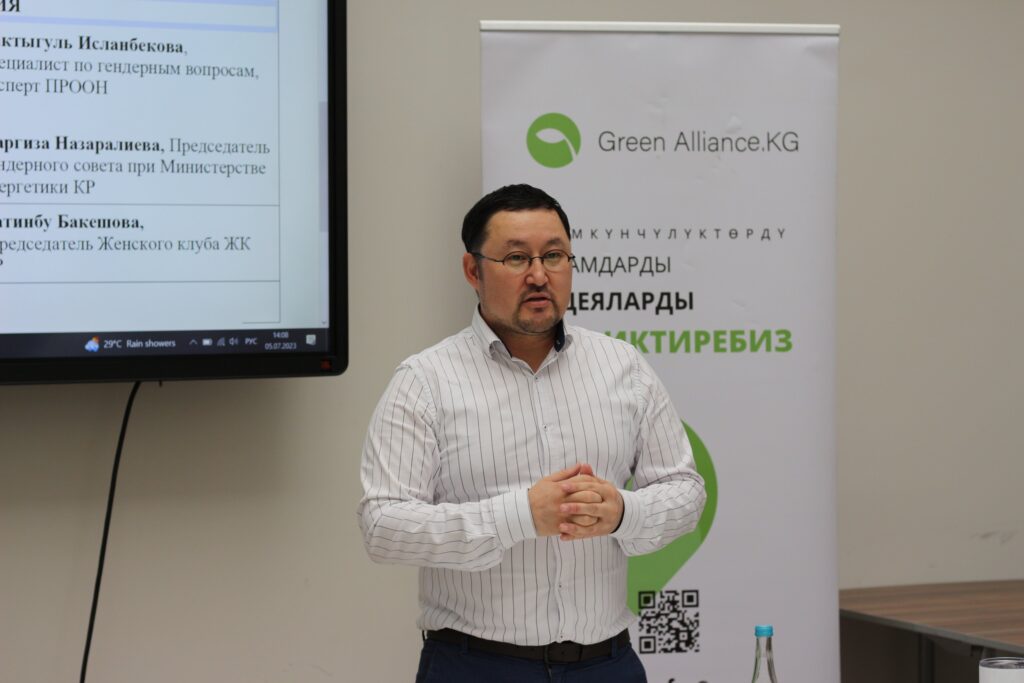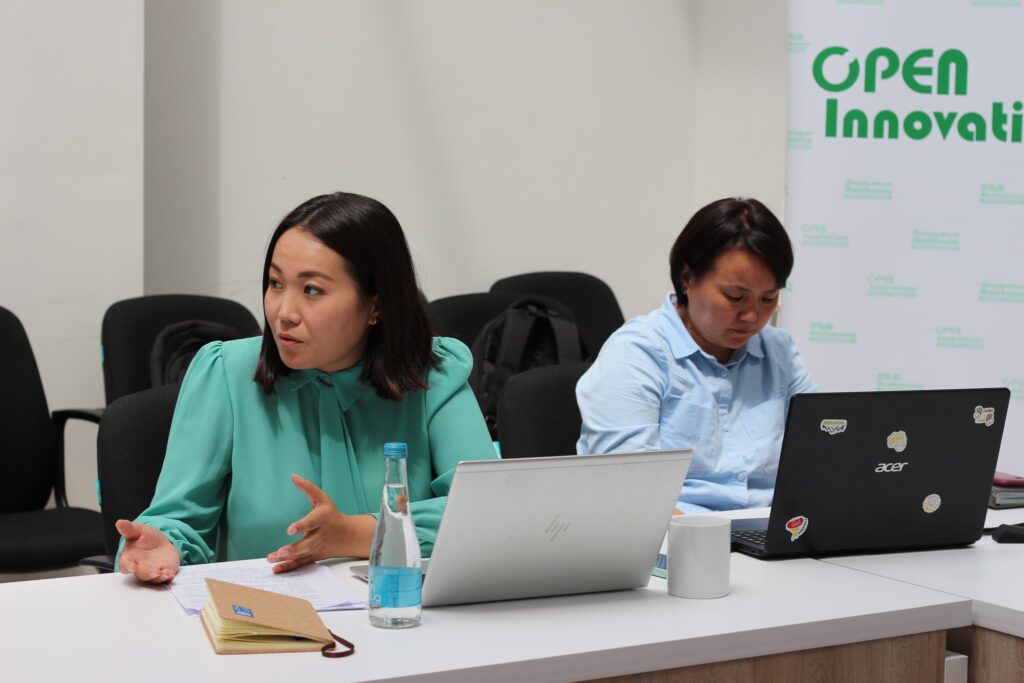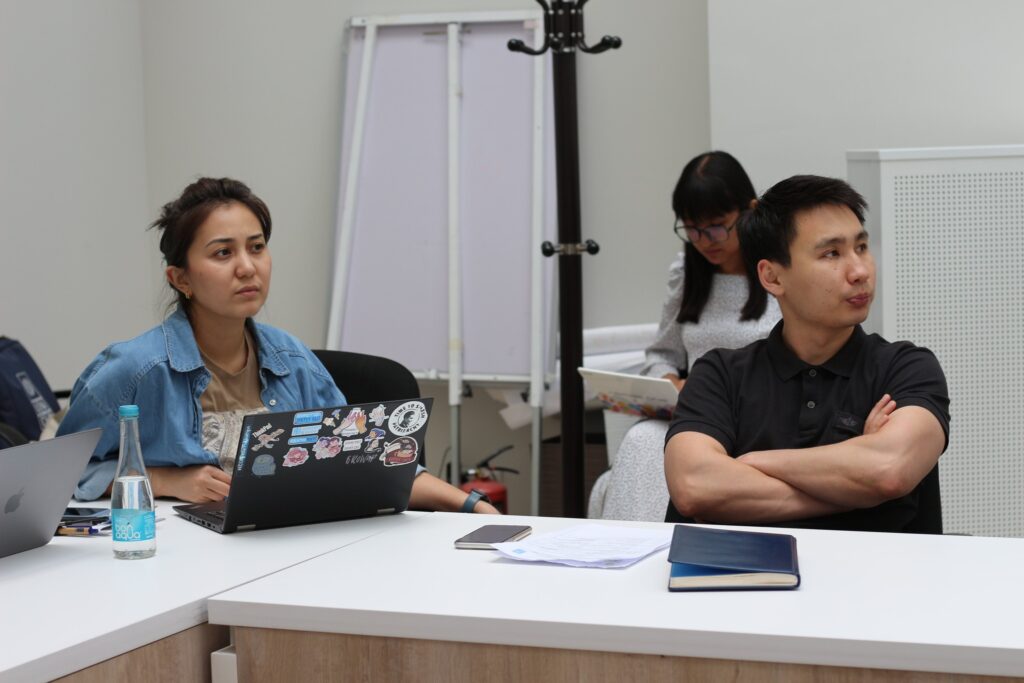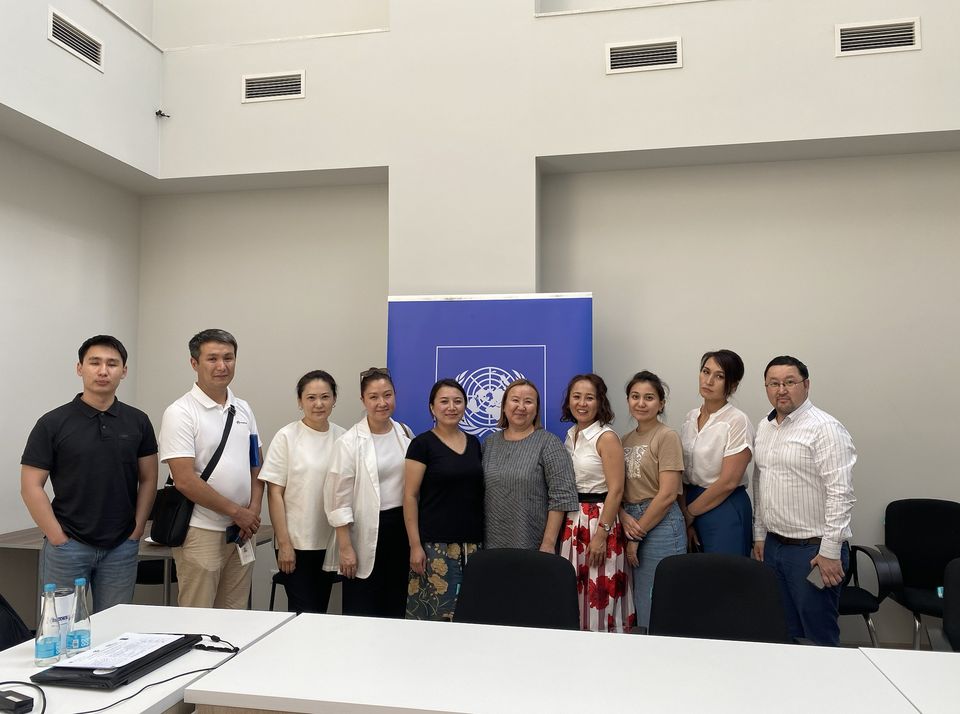
On 5 July, the experts discussed “NDC and LTS Implementation Plans in Gender dimesion” during a roundtable with the participation of stakeholders from the civil sector, private and public banks, NGOs, academia, youth and others
 Ms Baktygul Ysabekova, UNDP Coordinator for the implementation of NDC/LTS, in her presentation on the project “Climate Promise, Phase 2: From Promise to Action” shared in detail “On the Commitment, or NDCs (Nationally Determined Contributions) which is a crucial step towards net zero GHG emissions and all this is done to achieve the goals of the Paris Agreement”. The key results in the country were announced, that is by 2025 to reduce its GHG emissions by 16.63% under the business as usual scenario and with international support by 36.61% and by 2030 to reduce GHG emissions by 15.97% under the business as usual scenario and with international support by 43.62%. And achievement of adaptation measures by sectors by 2025.
Ms Baktygul Ysabekova, UNDP Coordinator for the implementation of NDC/LTS, in her presentation on the project “Climate Promise, Phase 2: From Promise to Action” shared in detail “On the Commitment, or NDCs (Nationally Determined Contributions) which is a crucial step towards net zero GHG emissions and all this is done to achieve the goals of the Paris Agreement”. The key results in the country were announced, that is by 2025 to reduce its GHG emissions by 16.63% under the business as usual scenario and with international support by 36.61% and by 2030 to reduce GHG emissions by 15.97% under the business as usual scenario and with international support by 43.62%. And achievement of adaptation measures by sectors by 2025.
 Baktygul Islanbekova, Gender Specialist, UNDP expert spoke about gender aspects in NDC and also the issue of who is more vulnerable to the impacts of climate change. In the area of labour, gender equality is still hampered by a number of challenges, one of which is the existence of a significant gender gap in terms of the quantity and quality of jobs as measured by access to employment opportunities, wages, degree of social protection and occupational segregation and that only 14% are female heads of households and 70% of workers in the shadow labour market are also women. Women are more likely than men to be unemployed, with the problem of unemployment being particularly acute for young women. Women continue to predominate in unpaid work and care services, where their working hours, including paid and unpaid work, are often longer than men’s. The ratio of women’s average pay is 72% of men’s and women spend 3.6 times more time on unpaid domestic work and twice as much on childcare
Baktygul Islanbekova, Gender Specialist, UNDP expert spoke about gender aspects in NDC and also the issue of who is more vulnerable to the impacts of climate change. In the area of labour, gender equality is still hampered by a number of challenges, one of which is the existence of a significant gender gap in terms of the quantity and quality of jobs as measured by access to employment opportunities, wages, degree of social protection and occupational segregation and that only 14% are female heads of households and 70% of workers in the shadow labour market are also women. Women are more likely than men to be unemployed, with the problem of unemployment being particularly acute for young women. Women continue to predominate in unpaid work and care services, where their working hours, including paid and unpaid work, are often longer than men’s. The ratio of women’s average pay is 72% of men’s and women spend 3.6 times more time on unpaid domestic work and twice as much on childcare
“The importance of integrating a gender approach into the processes of analysis and decision-making in the field of sustainable development, climate change is due to the fact that women and men respond differently to changes in the state of the environment and can be affected by the consequences of climate change in different ways.” – B. Islanbekova noted. She added that according to the structure of the updated NDC implementation plan 26 gender-sensitive measures were identified for mitigation in 6 sectors and 51 gender-sensitive measures were identified for adaptation measures.
 A. Sagynbaeva, representative of the Gender Council under the Ministry of Energy of the Kyrgyz Republic, told about the establishment of the Gender Council in the energy sector under the Ministry of Energy of the Kyrgyz Republic, the task of which was to strengthen the implementation of gender policy in the strategic documents of the country. Implementation of gender approach is aimed at taking into account the specifics of the impact of political, socio-economic, cultural, etc. factors, in the context of climate change, on the health and well-being of men and women in the energy sector.
A. Sagynbaeva, representative of the Gender Council under the Ministry of Energy of the Kyrgyz Republic, told about the establishment of the Gender Council in the energy sector under the Ministry of Energy of the Kyrgyz Republic, the task of which was to strengthen the implementation of gender policy in the strategic documents of the country. Implementation of gender approach is aimed at taking into account the specifics of the impact of political, socio-economic, cultural, etc. factors, in the context of climate change, on the health and well-being of men and women in the energy sector.
The panel discussion was accompanied by heated discussions on topical issues related to gender, raising acute problems in different sectors and at the same time proposing ways and measures to address these problems and challenges.
 “The issues of equal rights and opportunities for women in the context of climate change should not be questioned, because it is women, children and the elderly, as the most vulnerable members of society, who suffer the most from the consequences of natural and man-made disasters. Lack of access to water, for example, deprives women of household chores, washing and preparing food for their families and children. Their role is enormous in the economic and social activities of society, and therefore their complicity at every stage of the implementation of the NC is important. There are certainly some achievements in gender equality and it is important that these are strengthened and duly applied in gender-sensitive measures as part of adaptation and mitigation of risks caused by climate change.” – concluded Ilgiz Kambarov, Executive Director of the Green Alliance KG, and thanked the participants for their active position and willingness to contribute to the gender dimension of the NDC.
“The issues of equal rights and opportunities for women in the context of climate change should not be questioned, because it is women, children and the elderly, as the most vulnerable members of society, who suffer the most from the consequences of natural and man-made disasters. Lack of access to water, for example, deprives women of household chores, washing and preparing food for their families and children. Their role is enormous in the economic and social activities of society, and therefore their complicity at every stage of the implementation of the NC is important. There are certainly some achievements in gender equality and it is important that these are strengthened and duly applied in gender-sensitive measures as part of adaptation and mitigation of risks caused by climate change.” – concluded Ilgiz Kambarov, Executive Director of the Green Alliance KG, and thanked the participants for their active position and willingness to contribute to the gender dimension of the NDC.
This activity is being implemented with the support of the UNDP project “Providing advisory support for the development of the “Enhanced Implementation Plan for the NDC and the Long-term Low Carbon Development Strategy (LTS) to 2050”.
This process is coordinated by the Ministry of Natural Resources, Environment and Technical Supervision of the Kyrgyz Republic and supported under the UNDP global initiative “Climate Promise: Phase 2”.
